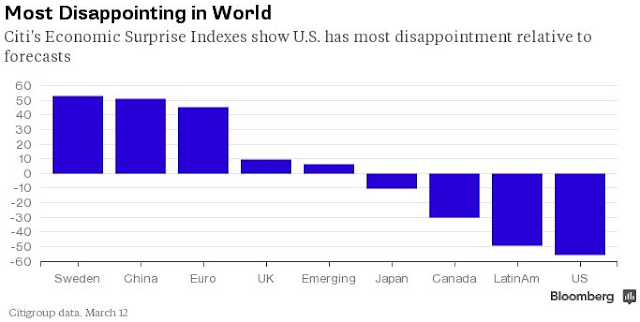One criteria investors and strategists evaluate on a regular basis is whether or not economic data that is reported on a near daily basis is exceeding or missing expectations. A commonly reviewed index is the Citigroup Economic Surprise Indices (CESI). According to Bloomberg,
"The Citigroup Economic Surprise Indices are objective and quantitative measures of economic news. They are defined as weighted historical standard deviations of data surprises (actual releases vs Bloomberg survey median). A positive reading of the Economic Surprise Index suggests that economic releases have on balance [been] beating consensus. The indices are calculated daily in a rolling three-month window. The weights of economic indicators are derived from relative high-frequency spot FX impacts of 1 standard deviation data surprises. The indices also employ a time decay function to replicate the limited memory of markets."
One takeaway from the negative level of the CESI for the U.S. is the fact economic reports have been falling short of strategist expectations. This in turn could push the Fed to act later on pushing short term interest rates higher. Also, as noted in a recent article in the Wall Street Journal, When Bad News Is Good for Stocks,
"It is important to understand, though, that the surprise index doesn’t rise or fall with the ebb and flow of the economic cycle. Because it measures a rolling average of how things turn out relative to forecasts, more often than not it tends to turn negative after there has been a streak of encouraging economic news, such as in late 2014. This is because forecasters often mistakenly extrapolate recent trends."
"When the index is deeply negative, as it is today, that is usually a good sign for stocks. Following the weakest 5% of observations since 2003, the S&P 500 rose by 14.4%, on average, during the following six months. Conversely, it rose by just 5.5% following times when the surprise index was highest."
"Today’s trough puts the index in the lowest 8% of readings. This is unusual given stocks are within spitting distance of all-time highs, despite softer-than-expected economic reports."
"The possible reason for this revolves around the Federal Reserve, which may be just months away from raising interest rates for the first time in nine years. News that is disappointing enough to sow doubt in rate setters’ minds without signaling a recession is seen as ideal for stock prices."
 |
| From The Blog of HORAN Capital Advisors |
Further, the CESI for the Euro Zone has been counter to that of the U.S., that is, economic data reports have been exceeding strategists' expectations and the Euro STOXX 600 Index has responded positively. We have commented frequently with clients about the recent need to hedge the exposure to the the Euro versus the US. Dollar in order to protect returns generated in the Euro currency.
 |
| From The Blog of HORAN Capital Advisors |
For investors, is this string of expectation beating reports in Europe nearing an end? We do not believe so. We are seeing corporate earnings report revisions trending more to the positive than the negative as well as continued expectation beating economic reports out of Europe. We touch on several of these points in our soon to be released Investor Letter. In a recent Bloomberg article,
"Jack Ablin, chief investment officer of BMO Private Bank in Chicago, said he pays attention to the surprise indexes as a way to gauge when a particular national economy may be turning and looks for good value in equities.
 |
| From The Blog of HORAN Capital Advisors |
It is an early indication of a momentum shift," he said, "adding that he's been raising the amount of money put into international stocks. While Ablin expects moderate U.S. growth, he said a strong U.S. dollar has the potential to dampen the expansion."
Interestingly, the Economic Surprise Indices readings could be suggestive of a market environment that is broadly favorable for a number of global equity markets. The desire by the U.S. Fed to get rates off the near zero level and data that pushes this further into the future and conversely, a number of central banks outside the U.S. pursuing quantitative easing measures, both can be positive for global equity markets.

No comments :
Post a Comment